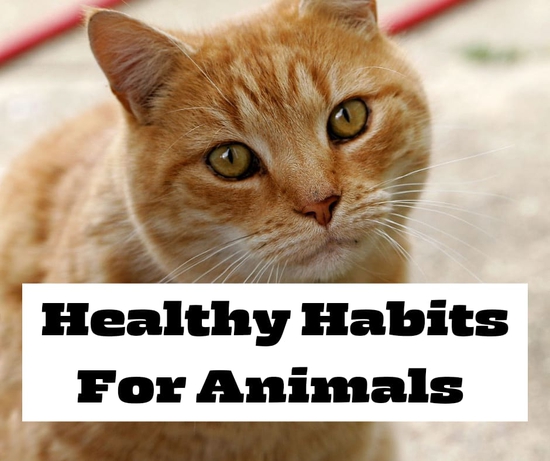
Healthy Habits For Animals
Healthy Habits For Animals
As caregivers for our animals, we work hard to keep them healthy—with vet visits, healthy food, regular brushings and the like. But sometimes we forget that they, too, can show us important ways to stay healthy and happy every day. Animals inherently integrate physical activity into their daily routines as a matter of survival and well-being. By observing animals, we can gain inspiration for how to incorporate daily exercise into our own lives. Here are some examples of animals and their daily exercise habits that we can learn from:
Here are few animal habits you need to emulate:
Animals, through their natural behaviors and instincts, exhibit many habits that can be deemed "healthy" or beneficial for their survival. Observing them can offer us insights into behaviors and routines that can also be beneficial for human well-being. Here are some healthy habits inspired by animals:
1. Regular Exercise: Many animals, like dogs, love to run and play. They remain active, which ensures they keep their muscles toned and heart healthy.
2. Balanced Diet: Some animals are selective with what they eat, ensuring they get a mix of nutrients. For example, pandas primarily eat bamboo, which provides them with the necessary nutrients they need.
3. Rest and Sleep: Cats are well-known for their love of sleep. Rest is essential for recovery and maintaining energy levels.
4. Hydration: Animals like elephants and Camels drink large amounts of water when available. This reminds us of the importance of staying hydrated.
5. Social Bonds: Many animals, like wolves or dolphins, thrive in communities or packs. Social connections can be crucial for emotional well-being.
6. Sunbathing: Animals like lizards sunbathe to absorb heat and produce essential vitamins. In moderation, sunlight is beneficial for humans too, helping with vitamin D synthesis.
7. Grooming: Many animals, like birds and cats, take the time to groom themselves, which can help prevent infections and remove parasites.
8. Stress Management: When threatened, animals often flee (flight) or stand their ground (fight). Once the threat is gone, they quickly revert to a calm state, demonstrating efficient stress recovery.
9. Intuitive Eating: Animals eat when they're hungry and stop when they're full, a good reminder for us to listen to our bodies.
10. Adapting to the Environment: Animals adapt their activities based on the season or time of day, like nocturnal animals or animals that hibernate. This can remind us of the importance of listening to our internal clocks and the environment.
11. Taking Breaks (Cats): Cats are renowned for their napping habits.
12. Stretching: Before embarking on activities, animals like cats and horses often stretch to prepare their muscles and joints.
13. Playtime (Dolphins): Dolphins engage in playful activities, reminding us of the importance of leisure and play for mental health and social bonding.
14. Don’t skip meals. Our animals love to eat, and they always tell us when their tummy clock goes off! But they’re very good at eating just the right portion at exactly the right time, not choosing to go hungry, and always minimizing treats (thanks in large part to us). These are good rules to live by See what happens to your body when you skip a meal.
15. Stretching (Birds & Cats): Before taking flight, many birds stretch their wings. Cats also stretch after waking up. Incorporating regular stretching can enhance our flexibility and reduce the risk of injuries.
16. Mindfulness (Predators): Predators like lions or hawks remain highly focused when hunting. This focus can be likened to a state of mindfulness, emphasizing the present moment.
17. Self-Care (Birds): Birds often preen their feathers, which can be seen as a form of self-care
18. Listening to Instincts (Deer): Deer are always alert to potential threats in their environment, demonstrating the importance of trusting and reacting to our instincts.
19. Seasonal Eating (Bears): Bears eat according to the seasons, consuming foods that are readily available at different times of the year. This can remind us of the benefits of consuming seasonal and local foods.
20 . Consistent Sleep Patterns (Chickens): Chickens follow a consistent sleep-wake cycle, waking up at dawn and sleeping at dusk. Establishing a regular sleep pattern can be beneficial for our health.
21. Adapting to the Environment: Animals adapt their activities based on the season or time of day, like nocturnal animals or animals that hibernate. This can remind us of the importance of listening to our internal clocks and the environment.
22. Flexibility and Balance: Incorporate flexibility exercises like yoga or pilates and balance exercises like tai chi. This can help reduce the risk of injuries and improve posture.
23. Dogs: Domesticated dogs often have bursts of energy, playing fetch or running around a yard. This reminds us of the joy and benefits of play as a form of exercise
24. Cats: Cats are known for their stretching, especially when they wake up. Implementing regular stretching into our day can help improve flexibility and reduce muscle tension.
25. Birds: Birds like sparrows and robins flit about, often in short bursts of high-intensity flying. This can inspire us to integrate short, high-intensity intervals into our workouts.
Blog Upload on - Oct. 26, 2023
Views - 2201

posted By -
Animals Super Store
Related Posts
-
Top Ten Best Pets in The World
April 6, 2022 -
 Types of All Goats Breed Name A to Z
Types of All Goats Breed Name A to Z
Jan. 17, 2023 -
Top 10 Smartest Dog Breeds
March 15, 2023 -
 Benifits Of Pet Adoption
Benifits Of Pet Adoption
May 15, 2023 -
A to Z List of Bird Names With Picture
Sept. 14, 2023 -
Sheep Farming Business
Nov. 1, 2022 -
Sheep Farming
May 9, 2022 -
King Cobra
April 19, 2023


